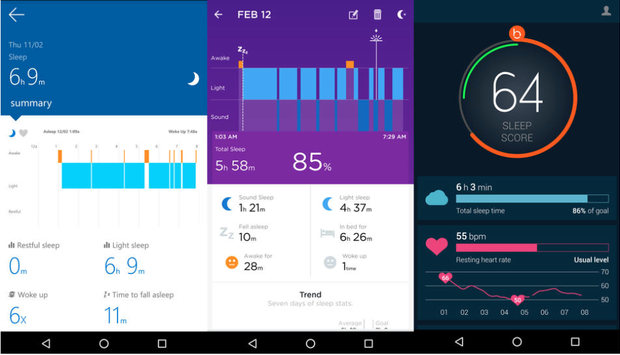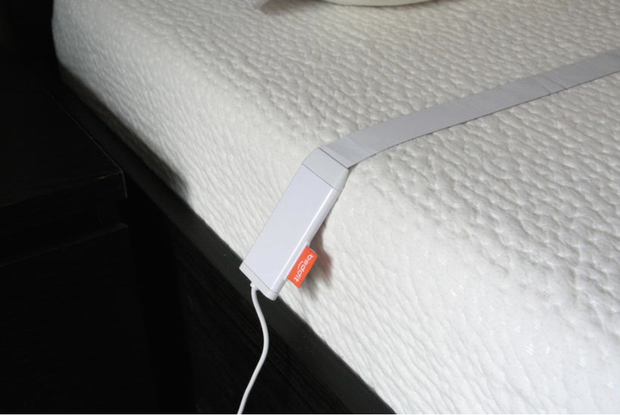How effective is your sleep tracker?
I'm pretty obsessed with tracking my sleep. Maybe even more than my step count or my exercise or calories -- or any of the other things I have a score of apps installed to help me keep track of. I'm not a good sleeper, which I think contributes to an unnatural focus on my sleepy times. I aim for seven hours a night and average around six and a half, which my body seems to think is normal.
But I've been using the same wristband wearable to track sleep for a while now and wondered if I could do better. There's a multitude of options out there for people with a passion for analysing their nocturnal downtime, so I road-tested (bed-tested?) a few of the most popular sleep-tracking methods.
What I tested
As a glutton for both punishment and sleep data, I elected to test out five different devices that track sleep:
The Jawbone is my tried, tested and much-loved default tracker. It never leaves my wrist (except for the odd battery charge) and I've found that it's pretty accurate when gauging my night's sleep. I've written about using the Jawbone range for sleep challenges before. In this informal test, we can think of this as the control device, as I know it's quite accurate when it comes to my sleep. It's lightweight and has great battery life, but with no screen or buttons you need to use the app to get data and change modes.
The Microsoft Band 2 only just launched in Australia (and we never saw the first one over here) so I've been mostly playing around with it for the really quite excellent fitness and exercise tracking. It even has a UV sensor, which is great for the Aussie summer. Battery life, sadly, is no more than two days and it's much bigger than even the Charge HR.
Including the Charge HR was a must, as Fitbit is very popular: the company is still the leader in the wearables market, and for many people the term "fitbit" is almost a generic name for "fitness tracker".
The Beddit had fascinated me since I first heard about it last year. This dedicated sleep tracker actually goes directly on top of your mattress rather than being worn, making it the most non-invasive tracking option in this test.
Finally, I decided to include a sleep tracking app. These use your phone's already impressive accelerometer to track your sleep patterns rather than relying on a dedicated bit of hardware. Being an Android kinda guy, I grabbed SleepBot from the Google Play Store. It's free and has an alarm function too.
What they track
Obviously all of these track the hours you spend sleeping and all of them track motion to get a sense of how restful (or restless) your sleep actually is.
Both Beddit and SleepBot can also tell you if you've been snoring: Beddit does this by being sensitive enough to analyse what's happening with your respiration, while SleepBot uses your phone's mic to detect sound.
The Charge HR and the Band 2 use their heart-rate monitoring to tell you all about your sleeping heart rate. Beddit gives you the same, as well as your breaths per minute. And all of them given you a fairly arbitrary score on your sleep, which is amazing if you're looking to gamify yet another aspect of your bodily functions.
What I found
I spent a week using all of the devices and comparing the data each morning.
It gets crowded: No matter what you might read on certain websites, you can definitely have too much going on in your bed. I am not a fan of having to keep my phone on the mattress and knocked my Nexus 6P onto the floor a few times while testing out SleepBot. Maybe I flail my arms like a Muppet when I sleep.
Size matters: Neither the Microsoft Band 2 nor the Fitbit Charge HR are particularly comfortable to wear while sleeping and the two together felt like an enhanced interrogation technique (not that you'll be wearing more than one).
SleepBot overestimated my sleep: SleepBot was definitely the most generous when it came to letting me know how long I'd been dozing. On Tuesday night SleepBot gave me 5 stars for a 7 hour 42 minute monster sleep. Everything else was showing me an average of 6 hours 40 minutes. I was reading in bed for a while that night and my best guess is that I was laying still enough for SleepBot to think it was actual sleep.
Sleep tracking takes effort: The Charge HR tracks sleep automatically. So does the Band 2 and the Up2, although you can also manually put those two into sleep mode. SleepBot and the Beddit Classic both need you to activate the app to start tracking. If you're too tired and forget, then no data for you.
Battery matters: Beddit is permanently plugged in, so you don't need to worry. The Charge HR and the Jawbone both have solid battery life. But the Microsoft Band 2 needs charging at least every second day, which is fine for a smartwatch that you can charge overnight but a pain for a device you want to wear while sleeping. And SleepBot had my phone running uncomfortably hot, although having a whole bunch of other devices connected by Bluetooth wasn't helping.
There's a lot of data: While heart rate during sleep can be a good indicator of overall health and while I like knowing how much sleep I get in a night, I'm not sure what to do with information such as how many times I was restless. It's the same with Beddit's "sleep score". The Fitbit and Jawbone give you a number indicating what percentage you got of your sleep goal. Beddit gives you a score and SleepBot a score out of five stars.
The big takeaway
I was genuinely surprised at how consistent the data was across the devices. Excluding SleepBot, everything gave me gave sleep timings within 10-15 minutes of each other, which is pretty good.
The only time there was a big difference was when I woke up to discover my cat had pushed me into the middle of the bed and off the Beddit, causing it to register me as AWOL. This, along with the lack of automatic recording, leaves me more likely to recommend one of the wearables over the Beddit.
In general I found the trackers that gave me sleep as a percentage of my goal to be far more useful than an arbitrary score or star rating. I like getting my restful and light sleep as two separate times, but it wasn't entirely clear what terms like "restful" or "deep" were actually being used to define.
For my money, the Microsoft Band 2 gave the best data set out of the devices and was the easiest to digest. But it's not comfortable to wear and the poor battery life is a serious problem.
I liked the automatic tracking on the Charge HR, but again it's not comfortable to wear in bed and I found that the green LEDs that the pulse rate uses had a lot of leakage: they could be quite disturbing in a dark room.
That leaves me with Jawbone Up2. It's small enough you can forget you're wearing it, it's accurate and it will automatically track your sleep even if you don't put it into sleep mode. The 10-day battery life is well worth the trade-off of not having a screen on the device and the price -- $100 -- makes it the cheapest tracker here, not counting SleepBot, which is free.
This article originally appeared on CNET.

